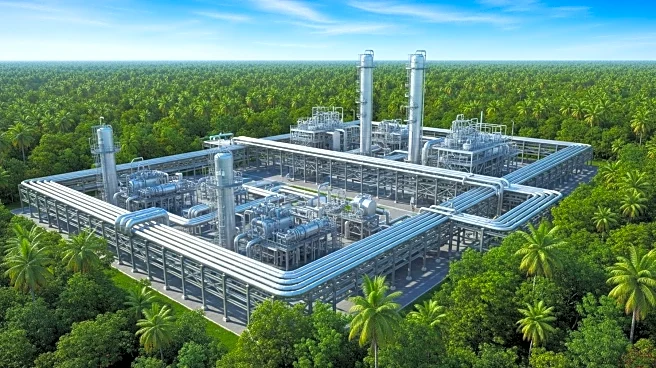What's Happening?
Eni SpA has given financial approval for the Coral Norte LNG project offshore Mozambique, valued at $7.2 billion. This project is set to double Mozambique's liquefied natural gas (LNG) production, adding 3.6 million tons per year to the global supply. The Coral Norte project will utilize the same design as Coral Sul, which began exporting LNG in 2022. Eni's CEO, Claudio Descalzi, announced that this development will position Mozambique as Africa's third-largest LNG producer, following Nigeria and Angola. The project is expected to commence production in 2028, marking a significant milestone in Mozambique's energy sector, which has faced challenges due to regional militancy.
Why It's Important?
The approval of the Coral Norte LNG project is crucial for Mozambique's economic development, potentially transforming one of the world's poorest nations by leveraging its substantial gas reserves. This project is expected to enhance Mozambique's position in the global LNG market, providing a boost to its economy through increased exports. Additionally, the project aligns with global energy demands, as LNG is considered a cleaner alternative to coal and oil. The development also highlights the ongoing interest in fossil fuel projects in Africa, despite global shifts towards renewable energy sources.
What's Next?
Production for the Coral Norte LNG project is slated to begin in 2028, with preparations underway by Eni and TotalEnergies SE to develop the necessary infrastructure. The project is expected to attract further investment and partnerships, potentially leading to more energy projects in the region. Stakeholders, including local governments and international energy companies, will likely monitor the project's progress closely, given its potential impact on regional energy dynamics and economic growth.
Beyond the Headlines
The Coral Norte LNG project underscores the complex balance between economic development and environmental concerns. While LNG is a cleaner fossil fuel, the project's approval amidst global net-zero commitments raises questions about long-term sustainability and environmental impact. The project may also influence geopolitical dynamics in Africa, as Mozambique strengthens its position in the energy sector.








